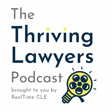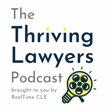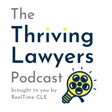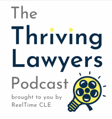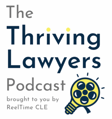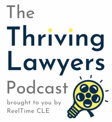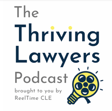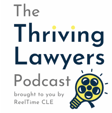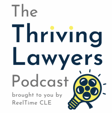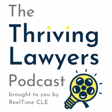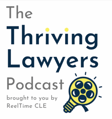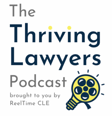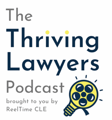Awakening Consciousness: Global Realization
00:00:02
Speaker
It's like the consciousness heated up and it was like popcorn popping all over the world. It's like people started saying that system doesn't work and I can't work inside of it.
Introduction to The Thriving Lawyers Podcast
00:00:22
Speaker
Welcome back to The Thriving Lawyers podcast. In this week's episode, join Michael Kahn for a wide ranging discussion with J. Kim Wright, integrative lawyer, author, innovator, and systems change agent. What would you say?
Kim Wright's Motivation: Love and Purpose
00:00:37
Speaker
What keeps you going, Kim? Are you seeing? I know you love it, so that's certainly that's probably the main thing that keeps it going. You said
00:00:46
Speaker
I don't know if it was before we started or during the interview, but you said you wouldn't do it if you didn't love it, which I think is wonderful. That's the way to be. I think I've done a decent job in that regard. I've got some tweaking to do, I think, still in my 62nd year that's coming up.
Transforming Legal Profession for the Future
00:01:10
Speaker
Oh, you're just a young fella, so you've got time. I do, I do. So what keeps you going other than loving it? Are you seeing some progress? Are you seeing some concrete impact of this movement? I am. So one of the things is that I'm just really fanatic about purpose.
00:01:39
Speaker
Yes, and individual purpose, my purpose and really align aligning with my purpose. And that's very energizing. And what is your purpose? What would how would you define that? Um, I'm actually in a restating time. But I would say that it's to the short
00:02:02
Speaker
way is talking about the transformation of the legal profession, the legal system, that we are building the legal system for the world that is evolving. Okay.
Initial Resistance at 2002 Conference
00:02:14
Speaker
So what are you seeing? So just to give a measure, in 2002, I went to a conference for an international legal group.
00:02:29
Speaker
And there were some speakers up on the podium, and I knew one of them, so I sat up front. And they had eight people at each table. And most of us didn't know each other. So as they do, they said, everybody introduce yourself. And they had an icebreaker question. And I introduced myself as being a lawyer who was a peacemaker and a healer. And seven people suddenly saw someone across the room that they had to go sit with. No.
00:03:00
Speaker
People left your table. Left my table. Everybody left, leaving you with your better stuff? Everybody left. I was sitting upright in front of the podium. It's middle school. Oh my gosh. It's middle school hell. This was 20 years ago, 2002? Yeah, 20 years ago. Wow. And so that's sort of one marker.
Progress and Acceptance of New Ideas
00:03:23
Speaker
Right. Then the ABA asked me to write a book.
00:03:30
Speaker
eight years later that the book came out. It was actually, I was named a legal rebel in 2009 and asked to write the book and 2010 the book came out. And so that actually shows huge progress. And then I think the way, the most exciting progress I'm seeing now is that there are so many people who are doing this work that I don't actually know.
00:03:57
Speaker
and they don't know that there's a movement. Like they just, they're in the middle of it and they've been courageous enough and they've gotten a whiff of something happening.
Global Change: The 'Popcorn Popping' Effect
00:04:10
Speaker
Like, you know, and it's not as scary as it used to be. Yeah. So is the movement, would you say the movement is,
00:04:21
Speaker
is mostly defined by collaborative law or it's bigger than that? Oh, it's much bigger than that. It's like the consciousness heated up and it was like popcorn popping all over the world.
00:04:35
Speaker
It's like people started saying that system doesn't work, and I can't work inside of it. And therefore, I have to create something new. And so, Stu Webb, who created collaborative law, was one of those early people, one of those early pioneers.
00:04:53
Speaker
But then restorative justice and therapeutic jurisprudence and creative problem solving. Those were also people who said, the other one's not working. What am I going to do? So the models were the first symptom. But now we have people who are like, I remember the first time I met somebody who was both a yogi and a lawyer. And it was the weirdest thing I'd ever seen. And I was the weirdest lawyer in town.
00:05:21
Speaker
When I tell the story, I actually think of my dear friends who live in Hawaii now, who are a couple who use yoga in their law practice. I have to stop you. How does that look? How do they use yoga in their law practice? Because yoga is about energy and about the shift in energy. And conflict is a type of energy. And so their work in energy helps them shift conflict.
00:05:50
Speaker
And so they've integrated who they are and what they care about and the consciousness work they've done with the legal system in a way that works
Authenticity in Integrative Law Movement
00:06:02
Speaker
for them. That is not what they earned in law school. That pattern, I see it over and over and over again of people saying, I don't want to do that. So I'm going to create this other thing.
00:06:13
Speaker
I probably know a hundred people who've created holistic law. Okay, so that's a sign. So would you say that one of the ways to define what you're describing, like you're the weird lawyer and these other lawyers are bringing yoga into their practice, that people are bringing their authentic selves to the practice of law and not
00:06:42
Speaker
not being limited by the cookie cutter approach that you felt limited to coming out of law school in the 90s, even now, of course, but less so now, a little less so now because of that. Yeah, I think authenticity is one of the important values of the integrative law movement.
00:07:04
Speaker
Okay, and that's what we call it after peacemakers came out We actually had a group of us who were leaders in different areas Actually got together and said this thing needs a name like we know we're doing something together But we don't have a name and and by consensus we chose the name integrative law So I didn't name it. It was named by the community and so since 2011 that's what we've called it and
00:07:32
Speaker
But it helps us to integrate our authentic self with the law, bring in some other values. Another piece of what it means to be an integrative lawyer is sort of reflecting on who I am and what I'm here for.
00:07:51
Speaker
whether, you know, how is the law working
Practicing Law Authentically
00:07:53
Speaker
or not? Right, doing like what you're talking about, coming up with a purpose with even maybe a, not a corporate in a corporate way, but a mission statement or vision statement, right? Yeah, yeah. And that's what I do with my clients. And, and then, and then the conscious contracts movement, I, you know, I was trained as a coach 30 years ago. And so, so, you know, we bring in that idea that, you know, like, who are you really?
00:08:17
Speaker
And if you could practice law in any way that expressed that, what would it look like? And so lots and lots of people are- Say that question again. I want listeners to hear that. Who are you saying? What was the question? Well, I'm not sure exactly how I said it then, but I- It was like, who are you really? Who are you really? And how can you bring that to the law? And how can you shape your law practice?
00:08:49
Speaker
Now, the challenge I would imagine, Kim, is the first thing that occurred to me in my head is money. You're talking that there might be people out there, many people out there, lawyers who want to change things. They've got kids, they've got a mortgage, they've got, obviously, whatever, bills to pay, et cetera, et cetera.
00:09:18
Speaker
And there's this excitement about what you're talking about. But how am I going to do that? I can't. That's scary. I'm going to be a weird lawyer. And how do I know I'm going to bring in the money that I need to?
Financial Viability of Conscious Law
00:09:35
Speaker
It looks like anything else. Yeah. It's like anything else. If you were to suddenly close one law practice and open a completely different practice, you would have a transition time.
00:09:47
Speaker
But I did a, I think it was for peacemakers, I did a little survey of asking lawyers who'd made the shift, how it affected their income. And some said it went up and some said it went down and some said it stayed the same, which is kind of what you expect if you're gonna do something really different. There are a lot of people who are making a lot of money in this because clients really love it, like especially in the conscious contracts work that I do,
00:10:15
Speaker
conscious clients are looking for lawyers who will do a more conscious approach with them and understand that what we're doing here is we're doing something kind of unique and think about Silicon Valley startups. They're trying to reinvent the world. And then there's this whole legal system that needs a bridge between it.
00:10:44
Speaker
So I have a lot of people in my circles who are making a lot of money in this model. I'm curious. Yeah, I'm curious. Can you quickly, because there are so many questions I want to ask, can you quickly describe what conscious contracts means?
Exploring Conscious Contracts
00:11:02
Speaker
So conscious contracts, the conscious contracts process is about putting the relationship first.
00:11:12
Speaker
And so what we do is that we start with a conversation about who are you, like if you and I are going into a contract, who are you and why do you want to do this? Like what is being expressed by this project for you? What are your goals? How does this actually forward your mission in the world? And I share the same information about me. And then we measure- Two people who are entering a contract together. Entering a contract.
00:11:39
Speaker
And so that's all the part about being in love. You know, if they're doing a startup, if they're getting married, if they're even going to rent a house from each other, there's this excitement of the beginning of the relationship. Let's capture what that is. And you and your role as a lawyer is to make that happen. Make that happen. But then what happens is they have that, like,
00:12:03
Speaker
that moment of, oh my gosh, this is like this sacred, wonderful space. And how am I gonna screw this up? Because I've done that before.
00:12:14
Speaker
And so then we actually have a conversation about how we're going to address change when it comes up and how are we going to resolve conflict when it comes up? And we look at how do we work. And, you know, like the one that's really easy to see is like, you don't schedule with me at eight in the morning because I'm, I'm still on the phone at 4 a.m. You know, like, you know, like there's a.
00:12:40
Speaker
Um, you know, like there's certain working patterns of mine that if you're going to work closely with me, you need to understand, well, we're going to talk about those and we're going to put those in our contract as well. So that it, um, so we put all of that in and then we look to see how do we, how do we, um, actually put in all of the nuts and bolts? Like what are the promises we need to make to each other, um, to make the goal that we've set out actually achievable?
00:13:09
Speaker
And that's what a conscious contract does. It's written in plain language. Sometimes we use a lot of visuals, whatever matches the people. And so that model.
00:13:23
Speaker
Well, that model is a really nice model for people who actually have a long-term relationship and expect to have a long-term relationship rather than the adversarial model of you and you and I are enemies and we've got to protect ourselves. We got to hold our cards close to the chest. You know, it's a paradigm shift. And your website is consciouscontracts.com.
00:13:49
Speaker
Is that right? And that's where folks, if they're interested in using that process, would reach out to you to make that happen. If anybody, any lawyers out there are curious about it, you can go to the website and check it out. Yeah. Yeah. We now
Global Reach of Conscious Contracts
00:14:07
Speaker
have people who speak 20 languages or do business in 20 languages, not just speak. They do business in 20 languages who are certified or have taken the basic training and are on their way to be certified.
00:14:18
Speaker
in the model. Okay, so you do training as well? Mm-hmm. Okay. Yeah. You said that you surveyed lawyers to see how they were doing in the collaborative law process. Was part of your survey asking them how they were doing with well-being?
00:14:47
Speaker
Do you have any sense of that and what kind of impact maybe it's made on lawyers who have made the shift?
00:14:54
Speaker
So they were collaborative lawyers at that point, although now integrative lawyers are in every area. But the survey had some open-ended questions where they talked about some of the trade-offs. And so I can tell you one of my own stories. When I was doing litigation in my early law practice, I think my overhead was something like $15,000 a month.
00:15:22
Speaker
just before I had to make $15,000 a month before I could do anything. And this was in the 90s. So just, you know, multiply that by however many factors. And when I stopped doing litigation and actually moved to a different city, my overhead was $500 a month. Wow. Which meant that the quality of my life changed drastically. Sure.
00:15:51
Speaker
You know, like I mean, I had, I had, um, so you didn't need as much staff as that way or office staff and not, I mean, I had a small office and yeah, it was, it was a lot of different things. Um, you know, like I didn't need the big copier with the automatic feeds, you know, I had a desktop copier, uh, you know, all the things that you have to do for litigation that are kind of just part of doing business went away.
00:16:20
Speaker
And so I didn't have to make as much money. And that's actually what allowed me to start becoming a speaker and a trainer and all those things, because I didn't need to be there for all the stuff that litigation requires. So do you do consulting, Kim? I'm thinking like if there's someone out there who's really intrigued by this and wants to do something different, wants to practice more authentically,
00:16:51
Speaker
Um, how would they start? What kind of resources are out there including are you a resource and yeah, i'm totally out there So the first thing would be to have a conversation with me because I mean I am a resource for that But i'm also a resource for who else might be a better match Because I never want to take uh, take on somebody who's not a perfect client for me
00:17:13
Speaker
I do it I do it a lot of different levels. So I work one-on-one with it, you know from law students to You know lawyers at the end of their career but I also like I've worked with the Basque government in Spain and and I've worked with
00:17:33
Speaker
There are several organizations there that were actually doing projects in the community to shift to a more collaborative community. So that included changing the legal system to make that easier. So any level. But you provide consulting, coaching, whatever you call it, but you also know others who are doing that. How would they reach out to you?
Contact Info for Kim Wright
00:18:01
Speaker
How would they find you?
00:18:03
Speaker
Do you want to give an email address? Yeah. Jay Kim Wright at gmail.com is the easiest. Jay Kim Wright, and that's Wright, W-R-I-G-H-T. Yeah. Jay Kim Wright at gmail.com would be how to connect with her. And like I said, with the liner notes, we'll include all the other ways to find you, LinkedIn, et cetera, right? Yeah.
00:18:32
Speaker
I know I'm very conscious of your time, so I know we only have a couple of minutes left, Kim, and there's a million more things we could talk about, but is there anything in particular that I haven't asked you about this or about a book or about anything that you feel like would be important to include in the discussion?
Kim Wright's Upcoming Book on Trauma-Informed Law
00:18:54
Speaker
I want to mention the Trauma Informed Law book. Please.
00:19:01
Speaker
It's coming out later, and I've had this amazing team. There are four of us who represent a very diverse group of women. And then we've got contributions from around the world. And what I already knew
00:19:23
Speaker
But I'm really struck by in the research we've done for this book is how trauma is sort of the core issue in the legal profession. We're either avoiding it or we're dealing with people who are traumatized without having been trained. The system is designed to traumatize more.
00:19:51
Speaker
We've got built-in systemic trauma and racism and misogyny and all of that that has been baked in for the last hundreds of years. So the book really aims to both show that and then show some ways that that can be different. I think it's a paradigm shifting book.
00:20:20
Speaker
And it's trauma on many levels. It sounds like you're talking about lawyers need to know how to deal with their clients who are coming in with trauma, some kind of trauma. Lawyers need to know how the stories that they're hearing, the pictures that they're seeing, the videos that they're seeing, how that is causing, could cause vicarious trauma or secondary traumatic stress, right?
00:20:49
Speaker
And then also talking about the system, particularly if you're a marginalized lawyer, if you're a lawyer for a marginalized group, if you're a female, if you're a lawyer of color, if you're an indigenous lawyer, how that can impact you. So it's coming at trauma from lots of different angles. Yeah. Yeah. We actually had a philosopher contribute to the book. We've had psychologists contribute. We've had lawyers, we have judges.
00:21:14
Speaker
So, you know, as we lawyers do, we wanted to look at it from as many angles as we could, and we only had 300 pages to do this. So it's the beginning of a conversation. And say the name of the book again. Trauma-informed law, a primer for practicing lawyers. It's being published by the law practice management section. And when's it coming out? That's a very good question. Estimated sometime this year. Sometime this year.
00:21:41
Speaker
Okay. And you've done, one of your co-authors is, is it Myrna McCallum? It is Myrna. And she has a podcast. She does. Is it called Trauma Informed Law or something like that? I think it's called the Trauma Informed Lawyer. Trauma Informed Lawyer, which is very interesting. And she's an indigenous Canadian lawyer, is that right? She's an indigenous Canadian and she's very prolific. And then Helgi... Helgi Mackey? Mackey, yes. Helgi is in Toronto.
00:22:11
Speaker
who has really been studying the somatic perspective. And Marjorie Floristel, who is a law professor, former tenured contracts professor, who went back to school and got her master's degree in psychology and is working on her PhD, really focused on lawyer wellbeing and law student wellbeing. Well, that sounds like
Impact of Vicarious Trauma on Lawyers
00:22:37
Speaker
Great, I know Helgi, she was on a round table with me in a program I did for Osgood Law School. She's great, but it sounds wonderful. I definitely wanna get ahold of that book. We do programs at real time on the impact, on vicarious trauma, the impact of vicarious trauma on lawyers. So I'm very interested in that book. So unfortunately, we're out of time
00:23:06
Speaker
And Kim, I'll give you one last chance. We could. Anything else you want to say about any last piece that you want to say before we wrap? I'm also working on three other books. One focused on grief and what lawyers need to know about grief that is being co-authored by several lawyers who are now experts at grief, some of them
00:23:31
Speaker
through circumstances, not the other. Well, that's one of my areas of expertise as a therapist. So I'm very interested in that. And then we also have lawyers as designers, which I'm doing with two Australian law professors and one from the UK, where we're collecting examples of excellent design and art that's being used in the law. Kim, you are just amazing in terms of
00:24:02
Speaker
Sure, you've heard it before. I don't know how you do it all, but you love it. I love it. And that's what fuels you, all this stuff you're doing, all the travel you're going to start doing again. Yeah, I'm going back on the road. When you come through Vancouver, let me know. I will. I will. We'll have a gathering of all the Vancouver people that I know that don't know each other.
00:24:22
Speaker
That would be fantastic. It's so good to see you. I can actually see her, even though you can only hear on the podcast, I can see her today. It's great seeing you, and let's keep in touch. All right, thanks, Michael. Thank you so much, Kim, and thank you, everybody, for listening. This podcast will probably be offered in two parts, so be sure and download both parts as they are dropped. Thank you, everybody.
00:24:52
Speaker
Thanks for listening to this episode of the Thriving Lawyers Podcast. We love hearing from our loyal listeners, so please feel free to email us any questions, comments, suggested topics, or guest recommendations at the following address, feedback at thrivinglawyerspodcast.com.
00:25:07
Speaker
The Thriving Lawyers Podcast is brought to you by Real-Time Creative Learning Experiences, a national provider of continuing legal education and professional development programs that leave participants engaged, encouraged, and equipped to pursue meaningful and sustainable change in their practices, their lives, and the organizations they work in. And by Osborne Conflict Resolution, your experience guides through the uncharted terrain of business and family law disputes based out of Charlotte, North Carolina. Thanks for listening, and we'll see you next time on The Thriving Lawyers Podcast.

